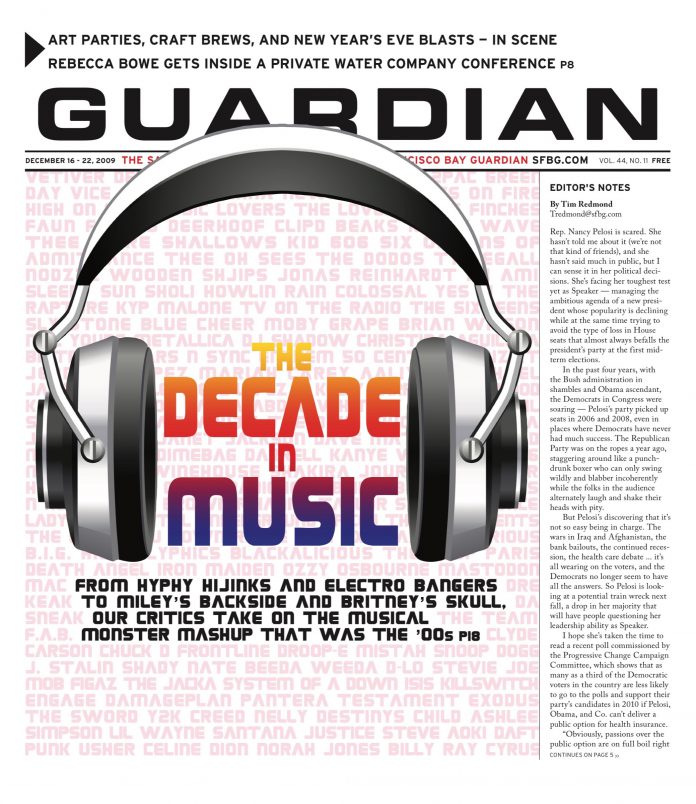
Guardian illustration of Cold Cave’s Wesley Eisold, Robert Smith, and Crocodile’s Brandon Welchez by Matt Furie and Aiyana Udesen
2009, will you be mine — my bloody valentine to 1989? More than once this year I’ve felt the effect of a 20-year loop. This sensation wasn’t quite déjà vu, but more a sense that the underground sounds of my youth were returning, slightly transformed, as outer-reach themes for another generation. It wasn’t mere recycling or brazenly wholesale copying. At times, it didn’t seem conscious. But it was undeniable.
Turn an ear to the opening instrumental dirge on one of the year’s most-praised albums, The xx (Young Turks), by the band of the same name. Its languid yet cold guitar lines seem to grow like so many nightcreeping vines from those of the Cure’s "Fascination Street" on Disintegration (Elektra, 1989). Elsewhere, the xx’s doped, lolling sensuality tapped into the early days of Tricky and the Wild Bunch, just before Massive Attack began to bloom in … 1990.
Turn another ear to the goth trance of Pictureplane on Dark Rift (Lovepump Unlimited) and the frozen odes of Cold Cave on Cremations (Hospital Productions) and Love Comes Close (Matador). Here we have new incarnations of Trent Reznor circa-Pretty Hate Machine (TVT, 1989) — industrial and electronic, yes, but with the kind of melodic sense that set Reznor apart. Cold Cave’s Wesley Eisold taps into Reznor’s rage on some of Cremations‘ louder moments, and his grasp of atmospherics is Flood-level. Travis Egedy of Pictureplane is more fey than Reznor, but he and Eisold, like their forebear, craft alienation anthems from lonely spots on a vast America.
Madchester, are you here again? The sweeter sounds on Dark Rift and a pop thrill such as Memory Tapes’ Seek Magic track "Graphics" wouldn’t be out of place on New Order’s Technique (Factory, 1988), which shifted from lush gleaming open stretches to more manic machinations. All praise electronic music in 1989, when Arthur Russell was moving from a world of echo to another thought, and Bob Stanley and Pete Wiggs of Saint Etienne were putting together the first elements of a scheme that would soon yield Saint Etienne’s debut single, a 1990 cover of Neil Young’s "Only Love Can Break Your Heart."
Twenty years from their inception, Saint Etienne are a major touchstone for some of this year’s most acclaimed or interesting releases. Every act on the Swedish Sincerely Yours label could qualify as a child of Saint Etienne’s Foxbase Alpha (Heavenly, 1991), or as baggy-era revivalists. In 2008, that meant the Honeydrips, and also the Tough Alliance, whose A New Chance suggested lost outtakes from Happy Mondays’ Madchester Rave EP (Factory, 1989). In 2009, jj’s No. 2 and Air France’s No Way Down tapped into the femme pop of Stanley, Wiggs, and Sarah Cracknell. A different, perhaps more fascinating phenom floats forth from the radiophonic odds and ends of Foxbase Alpha and especially Saint Etienne’s So Tough (Heavenly, 1992). Rooj’s The Transactional Dharma of Rooj (Ghost Box) and Broadcast and the Focus Group’s Broadcast and the Focus Group Investigate Witch Cults of the Radio Age (Warp) go hauntologically further with Stanley’s and Wiggs’ practice of searching for spirits through a twist of the radio dial.
It’s 1989: Andrew Weatherall is about to fuse his dancefloor acumen with My Bloody Valentine’s noise-bliss on the epic "Soon." It’s 2009: Weatherall returns to the realm of epic rock electronics with Fuck Buttons’ Tarot Sport (ATP). Here in San Francisco, a new brigade of superb rock bands — Girls, the Mantles, the Fresh and Onlys — arrives, all of whom wouldn’t sound out of place on Alan McGee’s Creation label back when Shields was spending all of its money in the studio. This year brings reissues of Loop’s Heaven’s End (Head, 1987), The World in Your Eyes (Head, 1987), Fade Out (Chapter 22, 1988), and A Gilded Eternity (1990, Situation Two), while spacemen-two acts such as California’s Crocodiles (on Summer of Hate, Fat Possum) and Moon Duo loop listeners back twenty years in time like a retro-futurist astronauts.
Just last week, the DJ Alexis Le-Tan told me that 2009 should have been another summer of love, like 1967 and 1988. In the new book 1989: Bob Dylan Didn’t Have This to Sing About (University of California Press, 198 pages, $21.95), the Bay Area critic and poet Joshua Clover uses Public Enemy, N.W.A., and the birth of Nirvana to establish 1989 as a pivotal year in popular music. It’s a point that the music this year argues just as convincingly on an understated scale, whether it’s Blues Control charting the quiet moments of Sonic Youth’s Daydream Nation (Enigma, 1988), Night Control coming off like the next Guided By Voices, or Kurt Vile and Wavves jousting cross-coastal for the role of son of Dinosaur Jr. Listen back to look forward.

